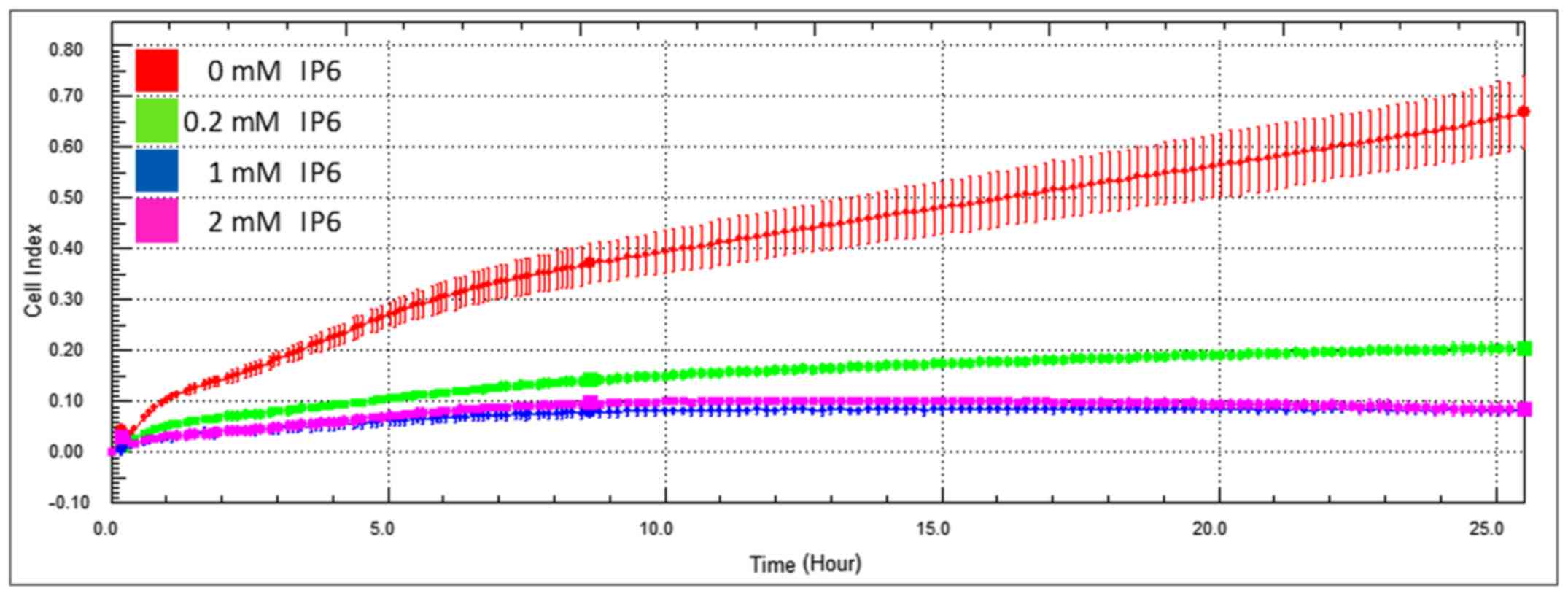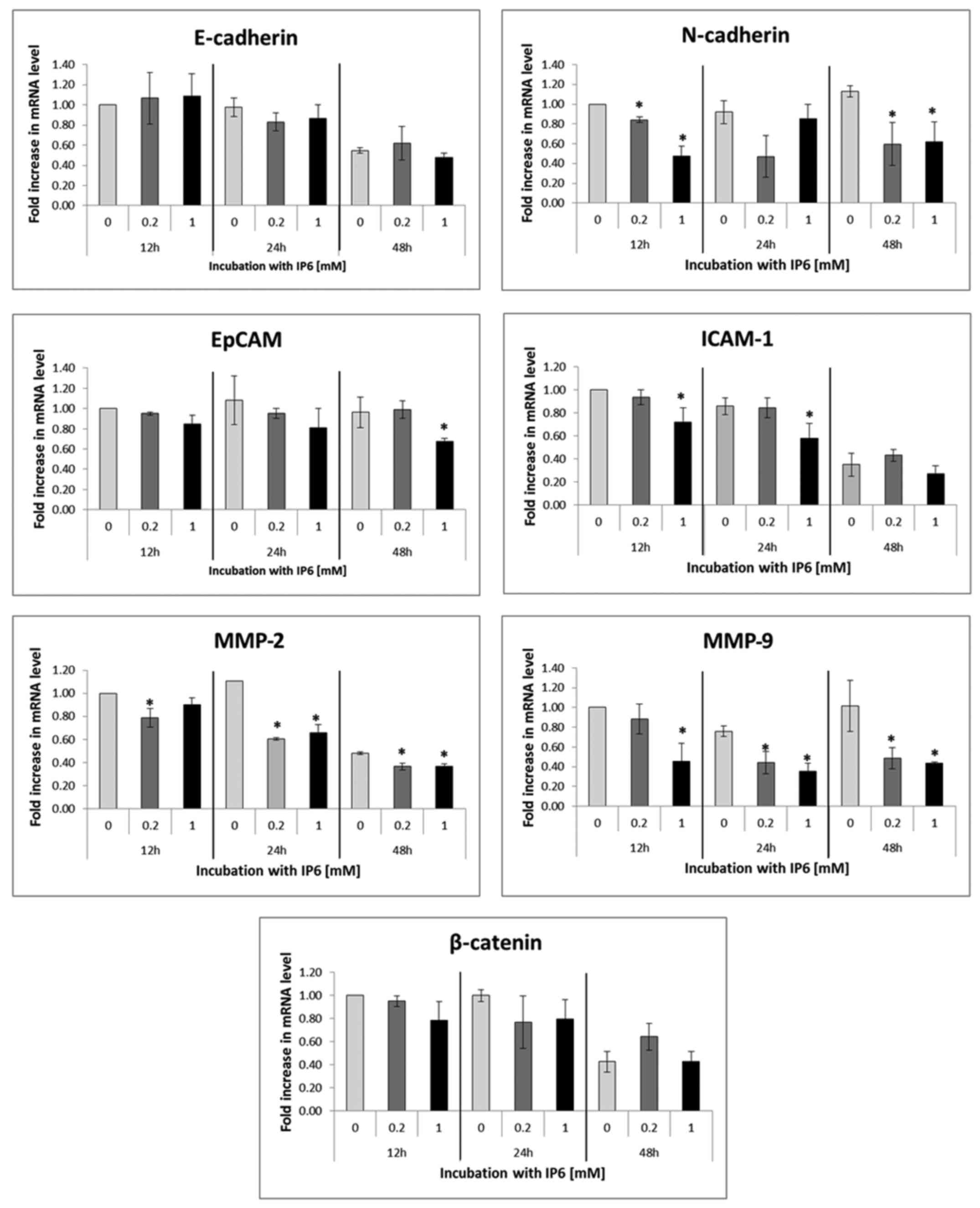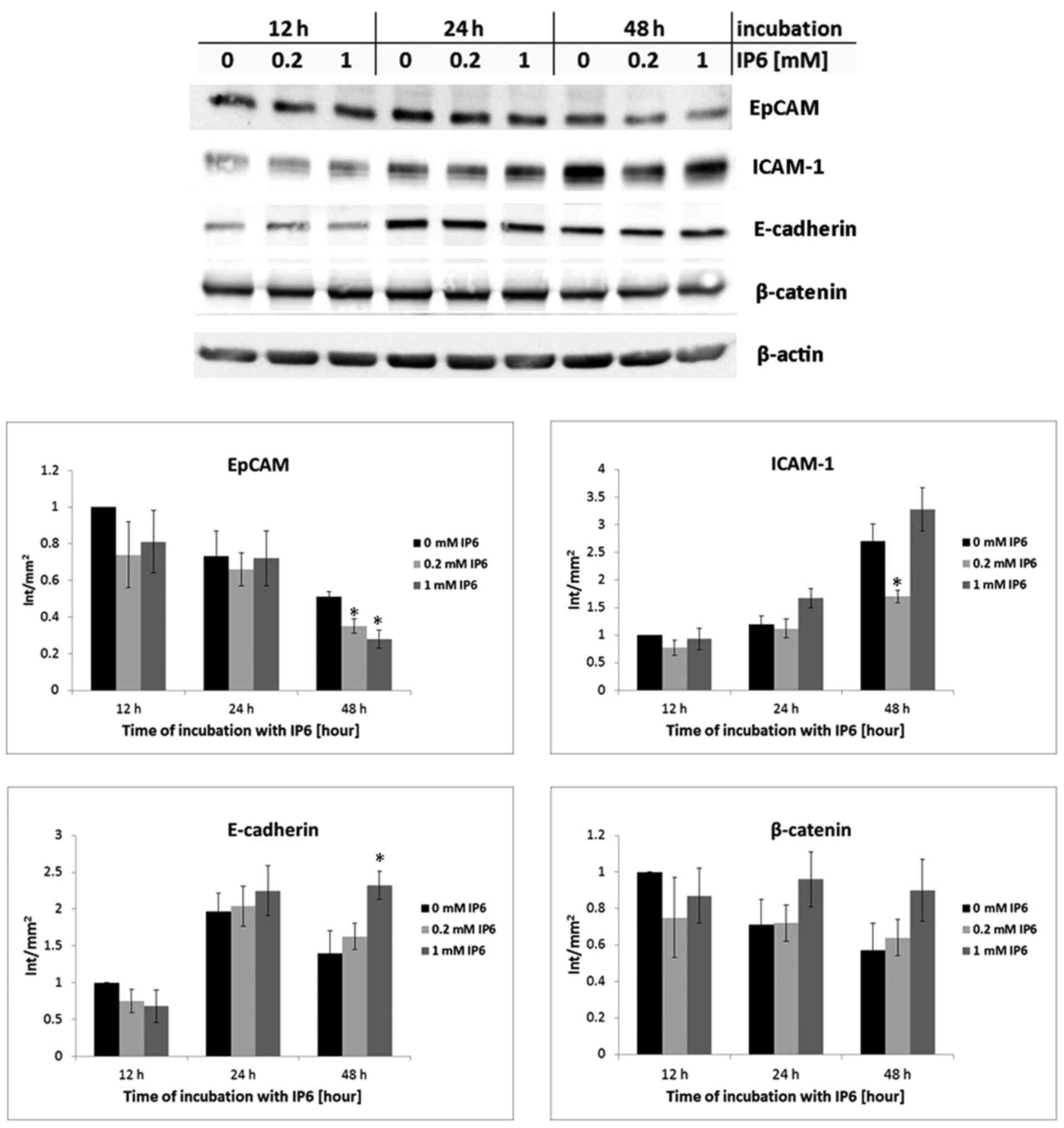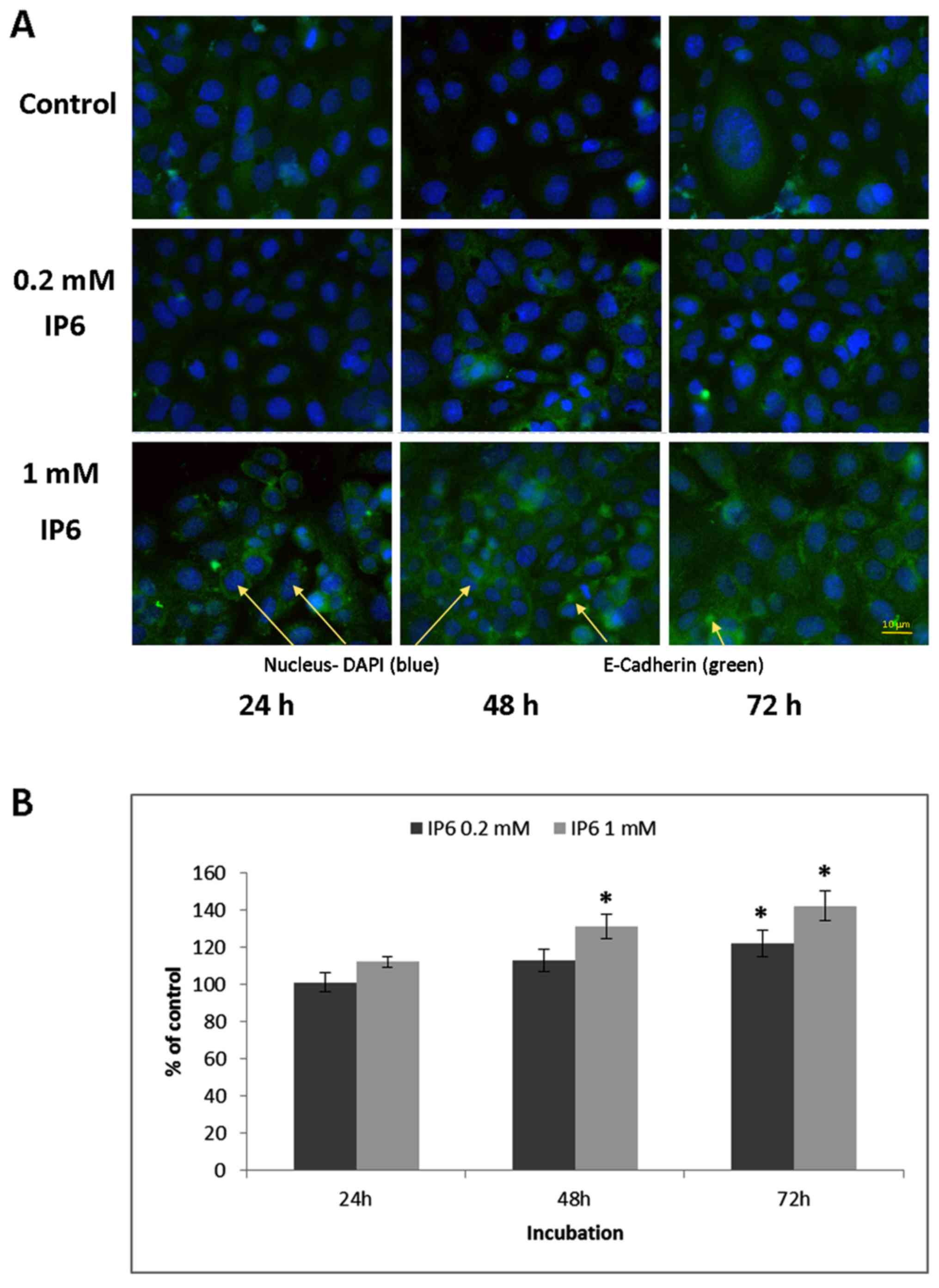|
1
|
McGuire S: World Cancer Report 2014.
Geneva, Switzerland: World Health Organization, International
Agency for Research on Cancer, WHO Press; 2015
Adv Nutr. 7:418–419. 2016. View Article : Google Scholar
|
|
2
|
Arnold M, Sierra MS, Laversanne M,
Soerjomataram I, Jemal A and Bray F: Global patterns and trends in
colorectal cancer incidence and mortality. Gut. 66:683–691. 2017.
View Article : Google Scholar
|
|
3
|
Liu G, Song Y, Cui L, Wen Z and Lu X:
Inositol hexaphosphate suppresses growth and induces apoptosis in
HT-29 colorectal cancer cells in culture: PI3K/Akt pathway as a
potential target. Int J Clin Exp Pathol. 8:1402–1410.
2015.PubMed/NCBI
|
|
4
|
Vucenik I, Ramakrishna G, Tantivejkul K,
Anderson LM and Ramljak D: Inositol hexaphosphate (IP6) blocks
proliferation of human breast cancer cells through a
PKCdelta-dependent increase in p27Kip1 and decrease in
retinoblastoma protein (pRb) phosphorylation. Breast Cancer Res
Treat. 91:35–45. 2005. View Article : Google Scholar : PubMed/NCBI
|
|
5
|
Vucenik I, Tantivejkul K, Zhang ZS, Cole
KE, Saied I and Shamsuddin AM: IP6 in treatment of liver cancer. I
IP6 inhibits growth and reverses transformed phenotype in HepG2
human liver cancer cell line. Anticancer Res. 18:4083–4090.
1998.
|
|
6
|
Gu M, Roy S, Raina K, Agarwal C and
Agarwal R: Inositol hexaphosphate suppresses growth and induces
apoptosis in prostate carcinoma cells in culture and nude mouse
xenograft: PI3K-Akt pathway as potential target. Cancer Res.
69:9465–9472. 2009. View Article : Google Scholar : PubMed/NCBI
|
|
7
|
Wawszczyk J, Kapral M, Lodowska J, Jesse
K, Hollek A and Węglarz L: Antiproliferative effect of inositol
hexaphosphate on human skin melanoma cells in vitro. Acta Pol
Pharm. 72:895–900. 2015.PubMed/NCBI
|
|
8
|
Wei J, Cheang T, Tang B, Xia H, Xing Z,
Chen Z, Fang Y, Chen W, Xu A, Wang S, et al: The inhibition of
human bladder cancer growth by calcium carbonate/CaIP6
nanocomposite particles delivering AIB1 siRNA. Biomaterials.
34:1246–1254. 2013. View Article : Google Scholar
|
|
9
|
El-Sherbiny YM, Cox MC, Ismail ZA,
Shamsuddin AM and Vucenik I: G0/G1 arrest and S phase inhibition of
human cancer cell lines by inositol hexaphosphate (IP6). Anticancer
Res. 21:2393–2403. 2001.PubMed/NCBI
|
|
10
|
Owen RW, Weisgerber UM, Spiegelhalder B
and Bartsch H: Faecal phytic acid and its relation to other
putative markers of risk for colorectal cancer. Gut. 38:591–597.
1996. View Article : Google Scholar : PubMed/NCBI
|
|
11
|
Bozsik A, Kökény S and Olah E: Molecular
mechanisms for the antitumor activity of inositol hexakisphosphate
(IP6). Cancer Genomics Proteomics. 4:43–51. 2007.PubMed/NCBI
|
|
12
|
Cholewa K, Parfiniewicz B, Bednarek I,
Swiatkowska L, Jezienicka E, Kierot J and Weglarz L: The influence
of phytic acid on TNF-alpha and its receptors genes' expression in
colon cancer Caco-2 cells. Acta Pol Pharm. 65:75–79.
2008.PubMed/NCBI
|
|
13
|
Sakamoto K, Venkatraman G and Shamsuddin
AM: Growth inhibition and differentiation of HT-29 cells in vitro
by inositol hexaphosphate (phytic acid). Carcinogenesis.
14:1815–1819. 1993. View Article : Google Scholar : PubMed/NCBI
|
|
14
|
Fu M, Song Y, Wen Z, Lu X and Cui L:
Inositol hexaphosphate and inositol inhibit colorectal cancer
metastasis to the liver in BALB/c mice. Nutrients. 8:82016.
View Article : Google Scholar
|
|
15
|
Kapral M, Wawszczyk J, Jurzak M, Hollek A
and Węglarz L: The effect of inositol hexaphosphate on the
expression of selected metalloproteinases and their tissue
inhibitors in IL-1β-stimulated colon cancer cells. Int J Colorectal
Dis. 27:1419–1428. 2012. View Article : Google Scholar : PubMed/NCBI
|
|
16
|
Tantivejkul K, Vucenik I and Shamsuddin
AM: Inositol hexaphosphate (IP6) inhibits key events of cancer
metastasis: I. In vitro studies of adhesion, migration and invasion
of MDA-MB231 human breast cancer cells. Anticancer Res.
23:3671–3679. 2003.PubMed/NCBI
|
|
17
|
Tantivejkul K, Vucenik I and Shamsuddin
AM: Inositol hexaphosphate (IP6) inhibits key events of cancer
metastasis: II. Effects on integrins and focal adhesions.
Anticancer Res. 23:3681–3689. 2003.PubMed/NCBI
|
|
18
|
Livak KJ and Schmittgen TD: Analysis of
relative gene expression data using real-time quantitative PCR and
the 2(-Delta Delta C(T)) method. Methods. 25:402–408. 2001.
View Article : Google Scholar
|
|
19
|
Schroterova L, Haskova P, Rudolf E and
Cervinka M: Effect of phytic acid and inositol on the proliferation
and apoptosis of cells derived from colorectal carcinoma. Oncol
Rep. 23:787–793. 2010.PubMed/NCBI
|
|
20
|
Shamsuddin AM, Vucenik I and Cole KE: IP6:
A novel anticancer agent. Life Sci. 61:343–354. 1997. View Article : Google Scholar
|
|
21
|
McFadden DW, Riggs DR, Jackson BJ and
Cunningham C: Corn-derived carbohydrate inositol hexaphosphate
inhibits Barrett's adenocarcinoma growth by pro-apoptotic
mechanisms. Oncol Rep. 19:563–566. 2008.PubMed/NCBI
|
|
22
|
Sharma G, Singh RP and Agarwal R: Growth
inhibitory and apoptotic effects of inositol hexaphosphate in
transgenic adenocarcinoma of mouse prostate (TRAMP-C1) cells. Int J
Oncol. 23:1413–1418. 2003.PubMed/NCBI
|
|
23
|
Somasundar P, Riggs DR, Jackson BJ,
Cunningham C, Vona-Davis L and McFadden DW: Inositol hexaphosphate
(IP6): A novel treatment for pancreatic cancer. J Surg Res.
126:199–203. 2005. View Article : Google Scholar : PubMed/NCBI
|
|
24
|
Vucenik I, Kalebic T, Tantivejkul K and
Shamsuddin AM: Novel anticancer function of inositol hexaphosphate:
Inhibition of human rhabdomyosarcoma in vitro and in vivo.
Anticancer Res. 18:1377–1384. 1998.PubMed/NCBI
|
|
25
|
Vucenik I, Tomazic VJ, Fabian D and
Shamsuddin AM: Antitumor activity of phytic acid (inositol
hexaphosphate) in murine transplanted and metastatic fibrosarcoma,
a pilot study. Cancer Lett. 65:9–13. 1992. View Article : Google Scholar : PubMed/NCBI
|
|
26
|
Oloumi A, McPhee T and Dedhar S:
Regulation of E-cadherin expression and beta-catenin/Tcf
transcriptional activity by the integrin-linked kinase. Biochim
Biophys Acta. 1691:1–15. 2004. View Article : Google Scholar : PubMed/NCBI
|
|
27
|
Stockinger A, Eger A, Wolf J, Beug H and
Foisner R: E-cadherin regulates cell growth by modulating
proliferation-dependent beta-catenin transcriptional activity. J
Cell Biol. 154:1185–1196. 2001. View Article : Google Scholar : PubMed/NCBI
|
|
28
|
Saad N, Esa NM and Ithnin H: Suppression
of β-catenin and cyclooxygenase-2 expression and cell proliferation
in azoxymethane-induced colonic cancer in rats by rice bran phytic
acid (PA). Asian Pac J Cancer Prev. 14:3093–3099. 2013. View Article : Google Scholar
|
|
29
|
Todosi AM, Gavrilescu MM, Aniţei GM, Filip
B and Scripcariu V: Colon cancer at the molecular level -
usefulness of epithelial-mesenchymal transition analysis. Rev Med
Chir Soc Med Nat Iasi. 116:1106–1111. 2012.
|
|
30
|
Dai M, Yuan F, Fu C and Shen G, Hu S and
Shen G: Relationship between epithelial cell adhesion molecule
(EpCAM) overexpression and gastric cancer patients: A systematic
review and meta-analysis. PLoS One. 12:e01753572017. View Article : Google Scholar : PubMed/NCBI
|
|
31
|
Yang Y, Jun CD, Liu JH, Zhang R,
Joachimiak A, Springer TA and Wang JH: Structural basis for
dimerization of ICAM-1 on the cell surface. Mol Cell. 14:269–276.
2004. View Article : Google Scholar : PubMed/NCBI
|
|
32
|
Paschos KA, Canovas D and Bird NC: The
role of cell adhesion molecules in the progression of colorectal
cancer and the development of liver metastasis. Cell Signal.
21:665–674. 2009. View Article : Google Scholar : PubMed/NCBI
|
|
33
|
Kapral M, Wawszczyk J, Jurzak M, Dymitruk
D and Weglarz L: Evaluation of the expression of metalloproteinases
2 and 9 and their tissue inhibitors in colon cancer cells treated
with phytic acid. Acta Pol Pharm. 67:625–629. 2010.
|


















